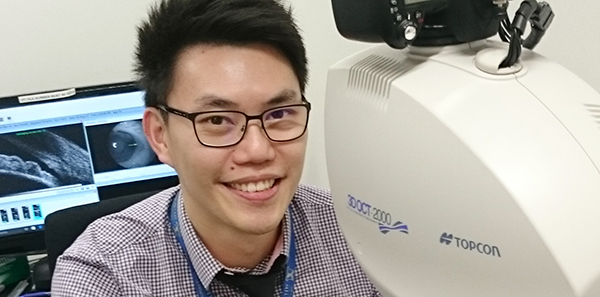1:30min

Jeremiah Lim
______________________________
By Rhiannon Riches
Assistant Editor
PhD candidate and practising optometrist Jeremiah Lim has been appointed lead consultant to develop Optometry Australia’s low vision care knowledge-to-action plan.
The plan will detail a set of practical recommendations for strengthening optometry’s role in low vision care. It will form the basis for Optometry Australia to advocate for or support targeted innovations to develop and utilise optometry’s capacity to provide access to low vision care.
Mr Lim will conduct a series of targeted interviews to scope the current capacity of optometry to provide low vision services. He will also conduct a review of relevant literature, investigate international low vision care models, and deliver recommendations for strategic activity that Optometry Australia can undertake.
As a practising optometrist working predominantly with an ageing demographic, he says he is acutely aware of the impact of eye disease on the quality of life of these patients.
‘While modern medicine has seen advances in the treatment of many eye diseases, the cure for common conditions such as glaucoma, macula degeneration and even diabetic retinopathy continues to elude us. Low vision services fill this gap, giving sufferers a chance to maintain their quality of life by allowing them to continue performing their activities of daily living.
‘I think this is a cause worth pursuing and that optometry is well placed in this role,’ Mr Lim said.
He says there is scope for improvement to support patients to access low vision care.
‘Currently, access to low vision services are hindered by professional and patient barriers. Professional barriers can include time pressure faced by clinicians and the relative lack of communication between practitioners regarding the low vision needs of a patient.
‘Patients themselves face barriers, which can include a lack of awareness of low vision services as well as socio-economic limitations and a dependency on others for mobility. Overcoming these barriers will take some effort and will require open dialogue between all stakeholders involved,’ he said.
Mr Lim is expected to deliver a draft report by 30 November 2017.
Optometry Australia’s low vision care knowledge-to-action plan is being overseen by a reference group of optometrists with a special interest in low vision.
Mr Lim is a PhD candidate at the University of Melbourne Department of Optometry and Vision Sciences where he alternates between research and teaching roles. He also works in private practice two days a week. He graduated from the University of Melbourne in 2009 and completed a Master of Philosophy degree in 2012, looking at the effects of raised intraocular pressure on retinal physiology.
‘In 2013, I embarked on a PhD with supervisors Dr Christine Nguyen, Associate Professor Bang Bui and Professor Algis Vingrys. As part of our research, we considered the viability of using the retina as a biomarker for brain disease such as Alzheimer’s. I’m currently working with the same supervisors to further this work,’ Mr Lim said.
He contributed to an article on Alzheimer’s disease and the eye in the September 2014 issue of Pharma.
In 2016, Mr Lim received a $1,000 Optometry Victoria travel grant to attend the Association for Research in Vision and Ophthalmology conference in Seattle. He presented a poster on his research investigating the potential to use inner retinal layers for early detection of Alzheimer’s disease.
Mr Lim is a member of the editorial board of Clinical and Experimental Optometry.